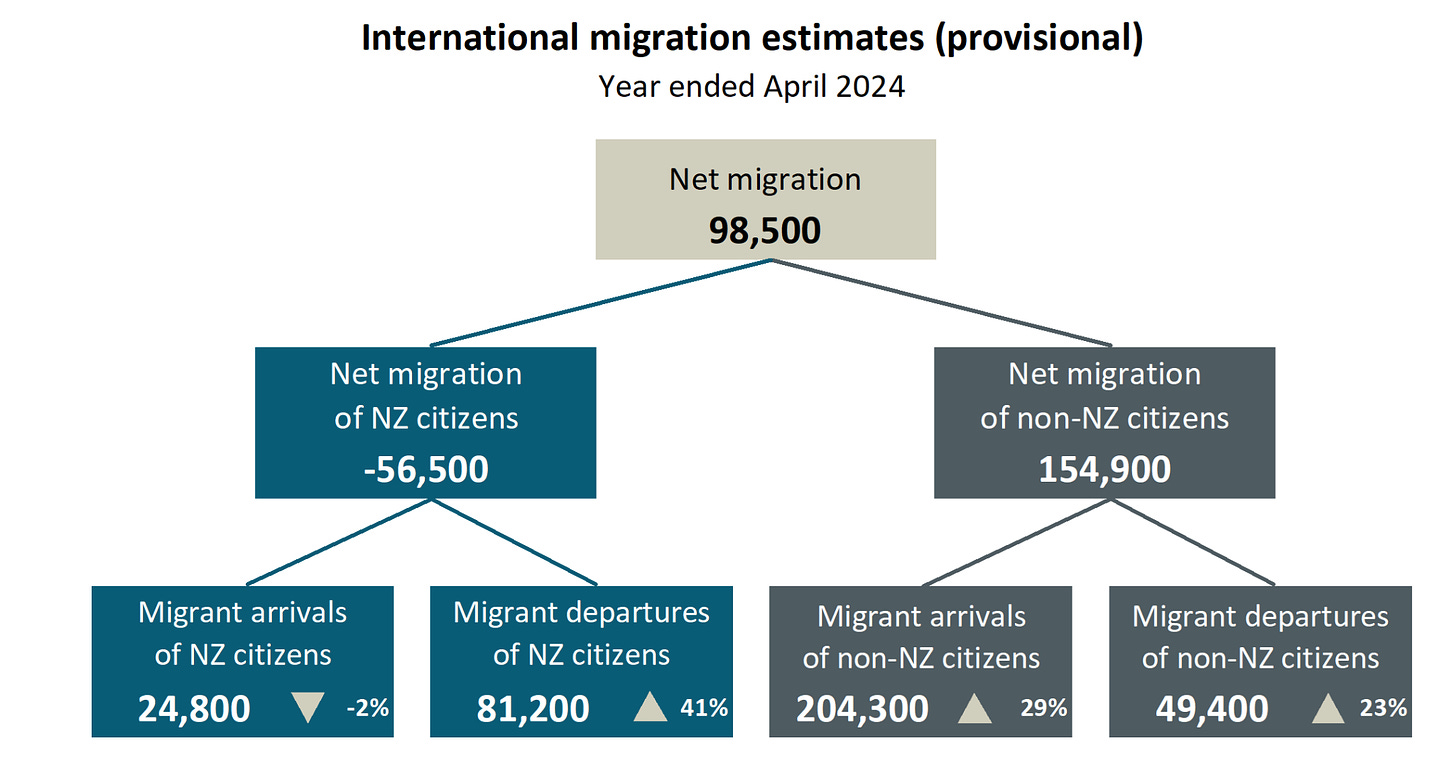‘Brain drain’ déjà vu as New Zealanders leave the country in record numbers
Over 81,000 New Zealand citizens left the country in the year to April – a 41% increase on the previous year.
Mōrena, and welcome to The Bulletin for Thursday, June 13.
In today’s edition: A brand new political podcast from The Spinoff looks back 40 years, Chinese premier Li Qiang arrives in New Zealand, and the Canterbury A&P show has been saved. But first, record numbers of New Zealanders are leaving the country. Haven’t we been here before?
Leaving home
Back in 2020, The Spinoff produced a six-part podcast series called Coming Home. It was focused on the influx of New Zealanders returning to Aotearoa during the Covid-19 pandemic, and it had a pretty optimistic tone. It’s still worth a listen if you missed it, but that podcast could not be made today. Because new figures from Stats NZ show people are leaving the country in record numbers. Eva Corlett at The Guardian has the key details, reporting that the 130,600 migrant departures was the highest on record for an annual period (though net migration showed a gain of 98,500, up from 85,800 a year ago). However, of those leaving the country long term, about 81,200 were New Zealand citizens – a 41% increase on the previous year. “With 24,800 New Zealand citizens arriving during the period, that put the net migration loss of citizens at 56,500 – exceeding the previous record of 44,400 in 2012,” Corlett wrote.
What reasons are there for the drop in migration?
These latest numbers aren’t a particular surprise, given there has been an ongoing trend with migration data in the aftermath of the pandemic. Last month, Q+A’s Jack Tame analysed the May data that showed more than a thousand New Zealanders were leaving the country every week. The headline on Tame’s piece was fairly provocative, asking “who could blame” people for deciding to leave. But he posits a number of reasons for the rise in international migration. The job market, for one, with rising unemployment. Then there’s the high cost of living here, specifically for those renting. “This renting generation, coincidentally, is the same generation most likely to have left New Zealand,” wrote Tame. In late April, rents were recorded at an all-time high, according to TradeMe. Conversely, house prices have “plummeted”, according to Newshub – though let’s remember Hayden Donnell’s view on reports like that. Economist Brad Olsen told The Guardian a number of younger people will be leaving the country for an overseas experience, but some will have been lured abroad with the promise of better housing and job prospects. Enter, the “brain drain”.
We’ve been here before
While you will probably picture the early 2000s when you think of the brain drain, a quick search through Papers Past reveals it’s been a concern on many prior occasions. In 1969, for example, The Press reported that “3,863 professional and skilled workers left New Zealand for more rewarding opportunities overseas” while “2,000 immigrants helped offset this brain drain”. Prime minister Christopher Luxon was quick to remind people yesterday that we’ve been here before. “You'll remember in the early 2000s there was a massive exodus of New Zealanders to Australia, and other parts of the world,” Christopher Luxon told reporters at Fieldays. "Our job is to build a long-term proposition where New Zealanders actually choose to stay in this country.” As this Stuff report from 2011 illustrates, the political response at that time was similar. Former finance minister Bill English said: "We know roughly what the recipe is, policies that support businesses that want to employ and create opportunities, that provide people with skills and reward those skills," he said. Compare that to what Luxon said yesterday: “By building good economic management, a safer society, better public services, New Zealanders came back."
Last month, RNZ’s Giles Beckford looked at the latest round of unemployment data, reporting that the number of unemployed people was estimated to be 134,000 – or 4.3% of the working population. As he wrote, the rise in unemployment can be linked to a slumping economy. “Throw in inflation pushing through 7%, and the Reserve Bank hiking interest rates to slow it down, the economy was bound to slow,” he wrote. A few days later, his colleague Susan Edmunds reported that the peak of unemployment could see a further 26,000 without work.
Is the grass really greener?
With high unemployment usually comes a struggling economy, something I’m sure will come as no surprise. A statement from Kiwibank’s economists yesterday said 2024 hasn’t got off to a good start. “We continue to expect the rest of 2024 to be a year of low growth, as high interest rates continue to depress demand,” they said. Social development minister Louise Upston told RNZ’s Giles Dexter in March that the economy being in recession could see our “best and brightest” choose to head across the ditch, something that’s been picked up on in Australia. We talked recently about the concerns Australia was attempting to poach New Zealand workers, especially from areas like education and law enforcement. The Spinoff’s Shanti Mathias looked at that in-depth almost a year ago. According to the Herald’s Liam Dann, there was a provisional net migration loss of 24,200 people to Australia in the year ended September 2023.
This report from the ABC last month (which was before the coalition’s first budget) focused on the state of our economy, the growing job cuts in the public sector and growing unemployment, concluding that “the appeal of higher wages in Australia and a chance at citizenship has seen the number of Kiwis making the move increase”. RNZ’s Susan Edmunds took a look this week at whether the grass really is greener in Australia, reporting that the average full-time weekly earnings were A$1,953.70 in November last year, compared with $1,558 in New Zealand.
The ghosts of 1984
In the last few Bulletins, you will have seen teasers for a brand new podcast from The Spinoff about the fourth Labour government. It’s called Juggernaut and the first episode has been released this morning. In an exceptional cover story today, the podcast’s host Toby Manhire reflects on the ghosts of 1984, looking at the reasons why the memory of the fourth Labour government has been kept alive for 40 years. I highly recommend you read Toby’s feature then tune into the first episode. New episodes will be released every week.
Listen to episode 1 of Juggernaut – I love you, Mr Lange
Sir Rob Muldoon calls a snap election, sparking a campaign of contrasts. The pretext for the election is the decision by Marilyn Waring to back an anti-nuclear bill and quit the National caucus. Lange, meanwhile, is about to confront a profound crisis, and launch a revolution. Follow now to make sure you get every episode.
Chinese premier arrives in New Zealand
Premier Li Qiang will arrive in the country today, the highest level visit by a Chinese official in seven years. We talked a bit about the significance of this on Tuesday, with prime minister Christopher Luxon set to meet Li for bilateral talks in Wellington. The Herald’s Thomas Coughlan looks this morning at why the visit is so important, noting Li will “land in a nation that is rethinking its relationship with the rising superpower in a way it perhaps was not back in 2017”. The visit also times with the release of a new Stuff Circuit documentary that the media outlet claims will “ramp up tensions further”. That will be released tomorrow, and Stuff’s Paula Penfold and Louisa Cleave say it will reveal that “Chinese Communist Party influence and interference operations in New Zealand have been going on for decades, unabated, striking at the heart of our democracy”.
Join The Spinoff Members
“The Spinoff has given me my faith in good journalism back.” Anja, Spinoff member since 2020. If, like Anja, you value our work and want to support us, please consider becoming a member today. Already a member? Ka nui te mihi, your support means the world to us.
Click and Collect
This interview on RNZ’s Checkpoint last night with a man forced to self fund his cancer treatment at $1,300 a week is devastating and essential.
The offer of a reward has seen people come forward with information about wanted Marokopa man Tom Phillips.
An explainer on the at-risk live animal exports ban from Emily Writes on her Substack.
National MP Maureen Pugh was allegedly assaulted after a Tākaka community board meeting.
Chris Hipkins tells Newsroom Pro’s Laura Walters that Labour has a “very good chance” of winning the 2026 election.
A Christchurch events company has stepped in to save the Canterbury A&P show, which will run as a slimmed-down version this year.
An inquiry into rural banking will be launched, with finance minister Nicola Willis saying “New Zealanders deserve a banking sector that is as competitive as possible”.
First home buyers who bought at the peak of the property market may have homes worth less than they paid for them, reports RNZ’s Susan Edmunds.
Liam Rātana rates MPs performances on a debate held on The Hui. Author Laurence Fearnley reflects on “a word that cradles the reader” for this week's Spinoff Books Confessional. With expletive-laden songs being played on the national broadcaster, Madeleine Chapman wonders what the f— is going on at RNZ. I argue that NZ's Best Homes is the opposite of the Sunday programme it replaced – it's working, but what does that say about us? Alex Casey discovers why we can't stop watching Border Patrol.
Pop culture picks, with Alex Casey
The Spinoff’s senior writer shares what’s on her reading list.
I am extremely excited by this trailer for We Were Dangerous, set in 1950s New Zealand following a group of delinquent gals institutionalised on a remote island. Directed by Josephine Stewart-Te Whiu (Waru, Ani) and written by New Yorker contributer Maddie Dai, it's already had rave reviews overseas and has been called a "funny and frightening tale of female friendship and fight".
It has been fascinating to watch the stratospheric ascent of the pop culture podcast Las Culturistas, and how the two hosts have had to wrangle with themselves becoming more and more famous, and therefore much closer to the A-listers they gossip and joke about. As Tina Fey said in the pod's famed 'I Don't Think So Honey' segment: "you are friends with Ariana and Spongebob now, that is your life."
Want to feel sick? Gremlins turns 40 YEARS OLD this week. To celebrate, I've got big plans involving four pieces of dark chocolate, a big cup of tea, and this exhaustive oral history of Gremlins by The Ringer. "They don’t follow any rules. And I think that not only 10-year-olds, but I think secretly a lot of 40- and 50-year-olds love that idea and live through the Gremlins vicariously.”
That’s it for The Bulletin today, thanks for reading. I’ll be back tomorrow morning.
Got some feedback about The Bulletin, or anything in the news? Get in touch with me at thebulletin@thespinoff.co.nz.
If you liked what you read today, share The Bulletin with friends, family and colleagues.
















